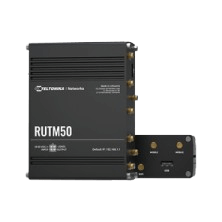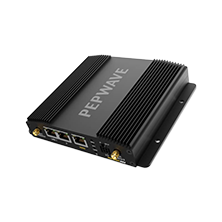What’s the Difference Between 5G and 4G Routers?
4G vs 5G Routers
In addition to cell phone signal boosters, Wilson Amplifiers is now also a leading provider of cellular routers from Peplink and Teltonika Networks. Our customers often ask about the difference between 4G and 5G routers. In this article, we’ll be sharing our expertise on the matter.
We fix poor cell phone signal! Find the right signal booster for you:




First, What is a Cellular Router?
A cellular router does not require a DSL, cable, or fiber connection to provide internet access. It taps into the cellular network through a SIM card, just like a phone. You can effortlessly connect devices like laptops, tablets, and IoT/M2M equipment wirelessly or over Ethernet.
Using cell towers rather than wires, 4G and 5G cellular routers offer more flexibility for use in fixed and mobile applications. They can be deployed as primary or backup internet solutions.
What is a 4G Router?
4G routers or LTE routers use the 4G (4th Generation) network to provide internet access to multiple devices. Since 4G and LTE offer extensive coverage, 4G/LTE cellular routers provide reliable connectivity in most places. Speed, capacity, and latency are all limited by the 4th generation specifications as well as cellular signal strength.
What is a 5G Router?
As you may have guessed, 5G routers use the 5G (5th Generation) network to provide internet access to multiple devices. When 5G is not available, they are also backward compatible with the 4G network. No matter where you are, connected devices continuously receive the best connection possible.
With 5G offering faster speeds, lower latency, and greater capacity than previous cellular network generations, 5G cellular routers keep more than just tablets, laptops, and security cameras online. From EV chargers and mobile security stations to robot fleets and smart farming equipment, they are becoming a crucial access point in the Internet of Things (IoT) space.
So, What’s the Difference Between 5G and 4G Routers?
The performance difference between 5G and 4G cellular routers comes down to their wireless network generation, which affects:
Frequency Band Support
Cellular routers communicate with cell towers via frequency bands. 4G routers support frequencies below 6 GHz. These frequencies can travel longer distances and better penetrate obstacles, hence why 4G offers wider coverage. However, these frequencies don’t yield the fastest speeds.
5G routers, on the other hand, support sub-6 GHz frequencies as well as mmWave frequencies starting at 24GHz and above. Higher frequencies provide significantly faster speeds at the cost of range and penetration. Thus, 5G is not available everywhere. But when connected to 5G, 5G routers outperform 4G routers. To learn more, visit our guide on 5G frequency bands.
Download Speed
4G and 5G download speeds vary depending on frequency band, network congestion, and signal strength. Under optimal conditional, 4G is specified to offer speeds up to 1 Gbps, while 5G offers maximum speeds of up to 20 Gbps.
Since 5G offers faster speeds than 4G, 5G routers can handle higher data rates. Though, this does not mean that a 5G router is better than a 4G router. It all depends on your specific application.
Network Latency
Latency, measured in milliseconds (ms), represents how long it takes your cellular router to send a signal and establish a connection.
Data transmission with a 5G router is much faster, making them ideal for applications requiring rapid response times. The theoretical latency for 5G is 1 ms, with real-world results ranging from 5 to 10 ms. 4G has a theoretical latency rate of 10 ms with a real-world range of 30 to 70 ms.
Like with speed, latency will also fluctuate based on network congestion and signal strength.
Network Capacity
Capacity represents the number of connections a network or device can support and how much data a network or device can handle.
While 4G can provide decent bandwidth and handle a considerable number of simultaneous connections, it does not compare to 5G. 5G has insane capacity, especially on the mmWave. This is a huge game changer for smart cities, autonomous vehicles, telemedicine, massive IoT, and more.
Compared to 4G cellular routers, 5G routers are better equipped to efficiently handle larger volumes of data and more devices.
Do I Need a 4G or 5G Router?
The best cellular router for you depends on your budget and connectivity needs. Both 5G and 4G routers are fast and reliable, but one is faster and more efficient than the other. That higher performance is reflected in the cost.
If 5G connectivity is important to you and it’s available in your service area, a 5G cellular router is a clear choice. And as the 5G coverage expands, it’s also a great option for future-proofing your network. Now, if your service area is predominantly covered by 4G, then a 4G router is sufficient. Here are our top 4G and 5G router recommendations:

With its advanced 5G technology, this Teltonika RUTM50 5G router is designed to give you the best connection. It has speed, stability, and advanced features that make it a great option for demanding applications. Versatile, it’s perfect for residential, commercial, vehicle, and IoT/M2M applications.

For a strong and safe internet connection over 4G, the Max BR1 Pro is great. Built with a CAT20 LTE modem, it offers download speeds up to 2 Gbps, making it perfect for businesses and homes. Supporting Peplink’s Speed Fusion, you’re able to build an unbreakable connection.
For more options, take a look at our full line of 4G and 5G cellular routers. If you need help selecting a cellular router that best fits your needs, please give us a call at 1-800-568-2723 or email us at sales@wilsonamplifiers.com. Our experts are happy to help.
Frequently Asked Questions
Do 4G Routers Work with 5G?
4G routers only work with the 4G network. They are not built to connect to the 5G network.
Can 5G Routers Be Used with 4G?
All 5G cellular routers are backward compatible with 4G, ensuring a reliable internet connection anywhere cell signal is available.
Can I Expect Better Coverage from 5G Routers?
Not necessarily. WiFi coverage provided by cellular routers depends on signal strength, WiFi frequency (2.4 GHz, 5 GHz, and 6GHz), and indoor obstruction. Under the same conditions, 4G and 5G routers will likely offer similar coverage. However, since 5G routers use more advanced technology, they provide a faster and more efficient connection.
Interested in Learning More? Check Out Our Signal Boosting Info Center


Money Back Guarantee

Technical Support